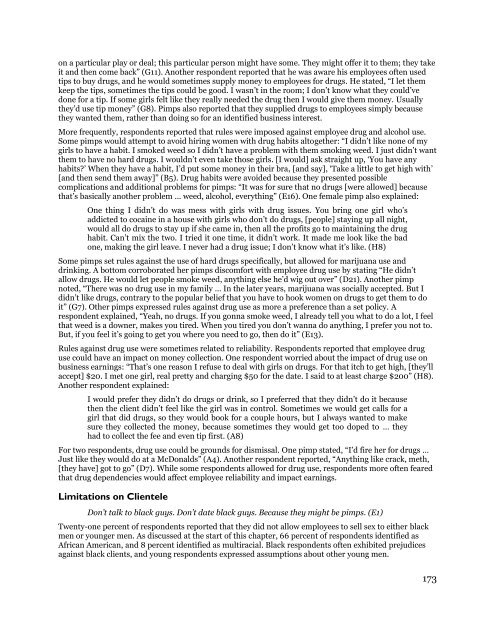413047-Underground-Commercial-Sex-Economy
413047-Underground-Commercial-Sex-Economy
413047-Underground-Commercial-Sex-Economy
You also want an ePaper? Increase the reach of your titles
YUMPU automatically turns print PDFs into web optimized ePapers that Google loves.
on a particular play or deal; this particular person might have some. They might offer it to them; they take<br />
it and then come back” (G11). Another respondent reported that he was aware his employees often used<br />
tips to buy drugs, and he would sometimes supply money to employees for drugs. He stated, “I let them<br />
keep the tips, sometimes the tips could be good. I wasn’t in the room; I don’t know what they could’ve<br />
done for a tip. If some girls felt like they really needed the drug then I would give them money. Usually<br />
they’d use tip money” (G8). Pimps also reported that they supplied drugs to employees simply because<br />
they wanted them, rather than doing so for an identified business interest.<br />
More frequently, respondents reported that rules were imposed against employee drug and alcohol use.<br />
Some pimps would attempt to avoid hiring women with drug habits altogether: “I didn’t like none of my<br />
girls to have a habit. I smoked weed so I didn’t have a problem with them smoking weed. I just didn’t want<br />
them to have no hard drugs. I wouldn’t even take those girls. [I would] ask straight up, ‘You have any<br />
habits’ When they have a habit, I’d put some money in their bra, [and say], ‘Take a little to get high with’<br />
[and then send them away]” (B5). Drug habits were avoided because they presented possible<br />
complications and additional problems for pimps: “It was for sure that no drugs [were allowed] because<br />
that’s basically another problem … weed, alcohol, everything” (E16). One female pimp also explained:<br />
One thing I didn’t do was mess with girls with drug issues. You bring one girl who’s<br />
addicted to cocaine in a house with girls who don’t do drugs, [people] staying up all night,<br />
would all do drugs to stay up if she came in, then all the profits go to maintaining the drug<br />
habit. Can’t mix the two. I tried it one time, it didn’t work. It made me look like the bad<br />
one, making the girl leave. I never had a drug issue; I don’t know what it’s like. (H8)<br />
Some pimps set rules against the use of hard drugs specifically, but allowed for marijuana use and<br />
drinking. A bottom corroborated her pimps discomfort with employee drug use by stating “He didn’t<br />
allow drugs. He would let people smoke weed, anything else he’d wig out over” (D21). Another pimp<br />
noted, “There was no drug use in my family … In the later years, marijuana was socially accepted. But I<br />
didn’t like drugs, contrary to the popular belief that you have to hook women on drugs to get them to do<br />
it” (G7). Other pimps expressed rules against drug use as more a preference than a set policy. A<br />
respondent explained, “Yeah, no drugs. If you gonna smoke weed, I already tell you what to do a lot, I feel<br />
that weed is a downer, makes you tired. When you tired you don’t wanna do anything, I prefer you not to.<br />
But, if you feel it’s going to get you where you need to go, then do it” (E13).<br />
Rules against drug use were sometimes related to reliability. Respondents reported that employee drug<br />
use could have an impact on money collection. One respondent worried about the impact of drug use on<br />
business earnings: “That’s one reason I refuse to deal with girls on drugs. For that itch to get high, [they’ll<br />
accept] $20. I met one girl, real pretty and charging $50 for the date. I said to at least charge $200” (H8).<br />
Another respondent explained:<br />
I would prefer they didn’t do drugs or drink, so I preferred that they didn’t do it because<br />
then the client didn’t feel like the girl was in control. Sometimes we would get calls for a<br />
girl that did drugs, so they would book for a couple hours, but I always wanted to make<br />
sure they collected the money, because sometimes they would get too doped to … they<br />
had to collect the fee and even tip first. (A8)<br />
For two respondents, drug use could be grounds for dismissal. One pimp stated, “I’d fire her for drugs …<br />
Just like they would do at a McDonalds” (A4). Another respondent reported, “Anything like crack, meth,<br />
[they have] got to go” (D7). While some respondents allowed for drug use, respondents more often feared<br />
that drug dependencies would affect employee reliability and impact earnings.<br />
Limitations on Clientele<br />
Don’t talk to black guys. Don’t date black guys. Because they might be pimps. (E1)<br />
Twenty-one percent of respondents reported that they did not allow employees to sell sex to either black<br />
men or younger men. As discussed at the start of this chapter, 66 percent of respondents identified as<br />
African American, and 8 percent identified as multiracial. Black respondents often exhibited prejudices<br />
against black clients, and young respondents expressed assumptions about other young men.<br />
173


